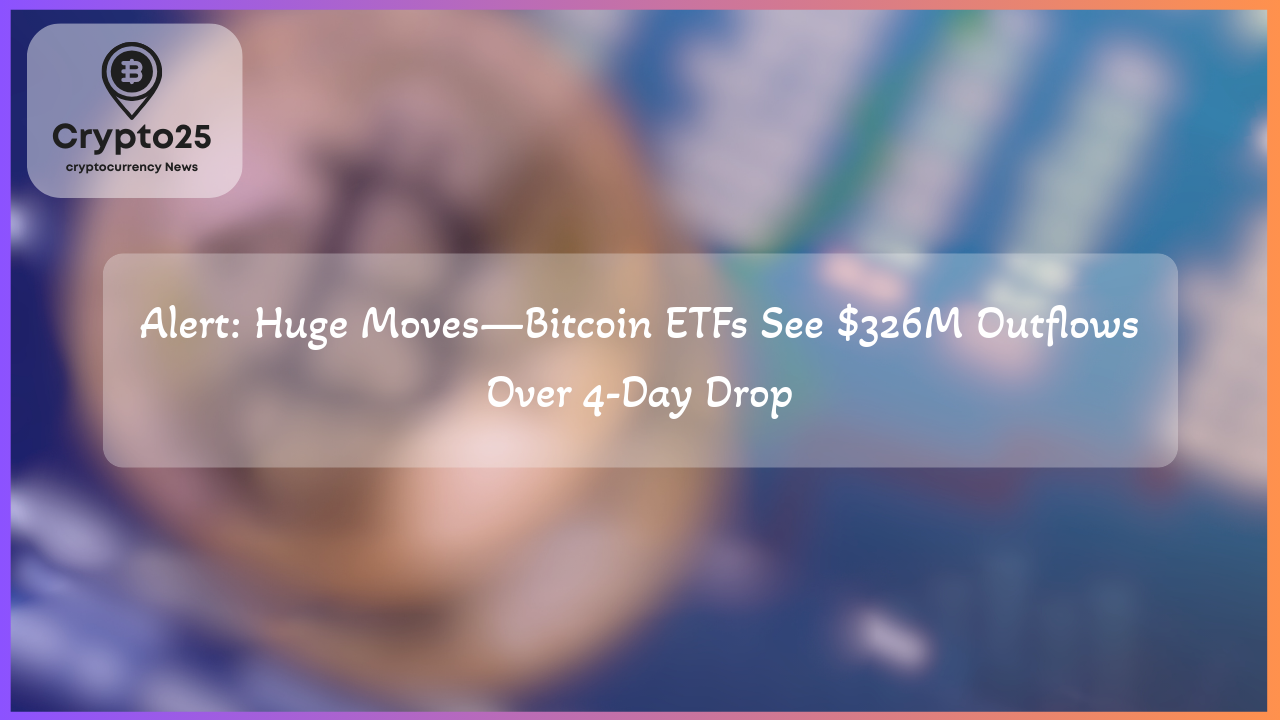
The cryptocurrency market recently witnessed significant turbulence as Bitcoin spot exchange-traded funds (ETFs) experienced a notable outflow of $326 million on April 8. This development marked the fourth consecutive day of redemptions, driven by a mix of macroeconomic challenges and global geopolitical concerns. BlackRock’s iShares Bitcoin Trust (IBIT) accounted for the lion’s share of the losses, shedding $252.9 million, with other key players like Grayscale and Ark also facing substantial withdrawals.
## Bitcoin ETFs See Major Outflows Amid Mounting Global Tensions
Bitcoin spot ETFs have been under immense pressure as investor sentiment remains cautious. On April 8, none of the top 10 Bitcoin ETF products reported any inflows, underscoring the prevailing risk-off mood. BlackRock’s IBIT led the decline, followed by outflows from Grayscale’s GBTC ($8.5 million), Ark’s ARKB ($20 million), and Bitwise’s BITB, which saw $21.7 million withdrawn. The withdrawal streak extended to Ethereum-focused ETFs as well, where nine funds collectively lost $3.29 million.
This bearish trend coincided with a broader crypto market downturn. Bitcoin’s price slipped 5.6%, landing at $75,523, while Ether plummeted 10.7% to $1,417 during early Asian trading hours. Analysts attribute this sell-off to fears surrounding the ongoing US-China trade war, compounded by news of impending tariffs from President Donald Trump. The lack of optimism for a swift resolution to these economic disputes has further dampened market sentiment.
| Title | Details |
|---|---|
| Market Cap | $2.4 Trillion |
| Bitcoin Price | $75,523 |
| Ethereum Price | $1,417 |
With the crypto market losing around 7% of its total valuation in just 24 hours, several altcoins struggled to offset the sell-off. However, the losses were not limited to digital assets alone, as equities markets also mirrored this risk-averse sentiment, further highlighting the interconnectedness of financial markets.
## Crypto Markets and Equities Reflect a Shared Risk Landscape
The pronounced outflows in Bitcoin ETFs reflect a growing alignment between cryptocurrency and traditional financial markets (TradFi). This correlation has been particularly evident during periods of heightened uncertainty. According to James Toledano, COO of Unity Wallet, the crypto market is no longer operating in isolation. “The industry has matured to the point where it now reacts to the same pressures that move the equities market,” Toledano noted.
Institutional investors were key drivers of crypto’s growth earlier this year, especially after the approval of multiple spot Bitcoin ETFs in the United States. However, recent data indicates waning interest from these large players as macroeconomic headwinds intensify. Rising geopolitical tensions, fears of tariff-driven economic slowdowns, and uncertainty ahead of central bank decisions are forcing investors to re-evaluate their risk exposure.
This interconnected behavior is a double-edged sword for crypto markets. On one hand, it underscores the sector’s credibility and acceptance among institutional players. On the other, it makes digital assets susceptible to the broader financial ecosystem’s volatility, limiting their appeal as an alternative, uncorrelated investment class.
## What’s Next for Bitcoin ETFs as Market Uncertainty Looms?
As the global economic landscape remains fraught with tension, the question on everyone’s mind is whether crypto ETFs can weather the storm. The recent sharp downturn has left investors debating if the sell-off marks a temporary dip or indicates a deeper retracement for digital assets. Historical trends suggest market recoveries often follow such corrections, but with no immediate resolution to macroeconomic and political issues in sight, the short-term outlook remains murky.
Bitcoin ETFs, once considered the beacon of institutional adoption, may face ongoing pressure as investors shift toward defensive strategies. For long-term crypto enthusiasts, however, this may present a buying opportunity. The upcoming earnings season, coupled with potential policy updates from global central banks, is likely to shape the next phase of cryptocurrency market dynamics.
Despite near-term declines, industry experts remain optimistic about the future of digital asset investments. The next wave of innovation, regulatory clarity, and widespread blockchain application may reignite interest. For now, though, Bitcoin ETFs and the larger cryptocurrency market appear vulnerable to a steady flow of global economic challenges.
As 2025 progresses, market participants will carefully watch Bitcoin’s moves, ETF performance metrics, and evolving geopolitical developments for signs of recovery. The intricate dance between TradFi markets and cryptocurrencies will likely continue, defining where crypto stands as both an asset class and a transformative financial technology.
